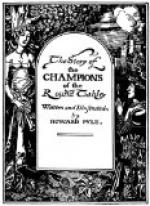[Sidenote: Sir Tristram departs from Cornwall] So Sir Tristram and the knights who were with him abode in that place for a day or two or three, and then one morning Sir Tristram armed himself and they armed themselves, and all took their departure from that castle and went down to the sea. Then they took ship with intent to depart to Ireland upon that quest Sir Tristram had promised King Mark he would undertake, and in a little they hoisted sail and departed from Cornwall for Ireland.
But they were not to make their quest upon that pass so speedily as they thought, for, upon the second day of their voyaging, there arose a great storm of wind of such a sort that the sailors of that ship had never seen the like thereof in all of their lives. For the waves rose up like mountains, and anon the waters sank away into deep valleys with hills of water upon either side all crested over with foam as white as snow. And anon that ship would be uplifted as though the huge sea would toss it into the clouds; and anon it would fall down into a gulf so deep that it appeared as though the green waters would swallow it up entirely. The air roared as though it were full of demons and evil spirits out of hell, and the wind was wet and very bitter with brine. So the ship fled away before that tempest, and the hearts of all aboard were melted with fear because of the great storm of wind and the high angry waves.
Then toward evening those who were watching from the lookout beheld a land and a haven, and they saw upon the land overlooking the haven was a noble castle and a fair large town, surrounded by high walls of stone. So they told the others of what they saw, and all gave great rejoicing for that they were so nigh the land. Therewith they sailed the ship toward the haven, and having entered therein in safety, they cast anchor under the walls of the castle and the town, taking great joy that God had brought them safe and sound through that dreadful peril of the tempest.
[Sidenote: Sir Tristram comes to Camelot] Then Sir Tristram said to Gouvernail: “Knowest thou, Gouvernail, what place is this to which we have come?” “Messire,” said Gouvernail, “I think it is Camelot.” And then those knights of Cornwall who stood by said, “Yea, that is true, and it is Camelot.” And one of them said: “Messire, it is likely that King Arthur is at that place at this very time, for so it was reported that he was, and so I believe it to be.”
“Ha,” quoth Tristram, “that is very good news to me, for I believe that it would be the greatest joy to me that the world can now give to behold King Arthur and those noble knights of his court ere I die. More especially do I desire above all things to behold that great, noble champion, Sir Launcelot of the Lake. So let us now go ashore, and mayhap it shall come to pass that I shall see the great King and Sir Launcelot and mayhap shall come to speak with the one or the other.” And that saying of Sir Tristram’s seemed good to those knights who were with him, for they were weary of the sea, and desired to rest for a while upon the dry land.




